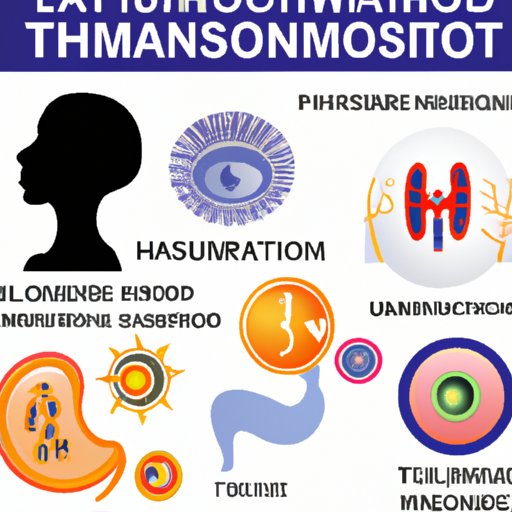
I. Introduction
Hashimoto’s disease is an autoimmune disorder that affects the thyroid gland, leading to an underactive thyroid. The thyroid gland is a butterfly-shaped gland located in the neck that produces important hormones that regulate metabolism and other vital functions in the body. In this article, we will explore the root causes of Hashimoto’s disease and shed light on the triggers and lesser-known factors that can lead to its development.
II. The Science Behind Hashimoto’s Disease: Understanding the Causes
The immune system plays a critical role in maintaining the body’s health and well-being. When the immune system mistakenly attacks healthy cells in the thyroid gland, it can cause damage to the gland, leading to an underactive thyroid. This process is known as autoimmune thyroiditis or Hashimoto’s disease.
Hashimoto’s disease develops gradually over time, and the symptoms may not appear until the thyroid gland is significantly damaged. The underlying cause of Hashimoto’s disease is not yet fully understood, but it is believed to be a combination of genetic and environmental factors.
The thyroid gland produces two primary hormones: triiodothyronine (T3) and thyroxine (T4). These hormones play a critical role in regulating metabolism, growth, and development. When the thyroid gland becomes damaged as a result of Hashimoto’s disease, it can lead to an underactive thyroid, also known as hypothyroidism. This condition can cause a range of symptoms, including fatigue, weight gain, and depression.
III. Exploring the Triggers of Hashimoto’s Disease: A Comprehensive Guide
There are several triggers that can contribute to the development of Hashimoto’s disease. One of the most common triggers is stress. When the body is under stress, it produces cortisol, which can affect thyroid function. Chronic stress can lead to long-term damage to the thyroid gland, making it more susceptible to autoimmune attacks.
Another trigger of Hashimoto’s disease is diet. Foods that are high in iodine, such as seaweed and some seafood, can trigger an autoimmune response in people who are predisposed to Hashimoto’s disease. Similarly, gluten and other inflammatory foods can also contribute to the development of Hashimoto’s disease.
IV. From Genetics to Environmental Factors: Uncovering the Root Causes of Hashimoto’s Disease
Genetic factors also play a key role in the development of Hashimoto’s disease. Studies have shown that people with a family history of autoimmune disorders, such as type 1 diabetes or lupus, are more likely to develop Hashimoto’s disease.
Environmental factors, such as exposure to toxins, can also contribute to the development of Hashimoto’s disease. Exposure to pesticides, heavy metals, and other toxins can damage the thyroid gland and make it more susceptible to autoimmune attacks.
Furthermore, Hashimoto’s disease is often associated with other autoimmune disorders, such as celiac disease and rheumatoid arthritis. These conditions share common genetic and environmental factors, which may contribute to their co-occurrence.
V. What You Need to Know About Hashimoto’s Disease: The Surprising Factors that Contribute to Its Development
There are several lesser-known factors that can contribute to the development of Hashimoto’s disease. One of these factors is poor sleep. When the body is not getting enough restorative sleep, it can affect thyroid function and make the immune system more susceptible to autoimmune attacks.
Another surprising factor that can contribute to the development of Hashimoto’s disease is vitamin D deficiency. Vitamin D plays a critical role in regulating immune function and reducing inflammation. Studies have shown that people with low levels of vitamin D are more likely to develop autoimmune disorders, including Hashimoto’s disease.
VI. The Complex Web of Causes: A New Perspective on Hashimoto’s Disease
Hashimoto’s disease is a complex condition that can be caused by multiple factors. While genetic and environmental factors play a significant role, lifestyle factors such as stress, diet, and sleep are equally important. People with Hashimoto’s disease can manage their condition effectively by addressing all of the factors that contribute to its development.
Some effective strategies for managing Hashimoto’s disease include reducing stress, following an anti-inflammatory diet, getting quality sleep, and taking supplements such as vitamin D and omega-3 fatty acids.
VII. Conclusion
Hashimoto’s disease is a complex condition that can be caused by multiple factors. By addressing the root causes of the condition, people with Hashimoto’s disease can manage their condition effectively and improve their quality of life. Whether it’s reducing stress, following an anti-inflammatory diet, or getting quality sleep, there are many strategies that people with Hashimoto’s disease can use to manage their condition.
If you suspect that you may have Hashimoto’s disease, it’s important to talk to your healthcare provider. Together, you can develop a comprehensive treatment plan that addresses all of the factors that contribute to the development of the condition.




